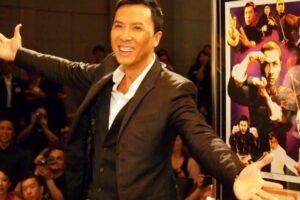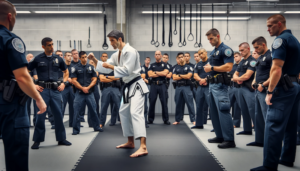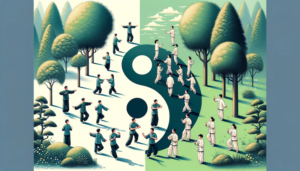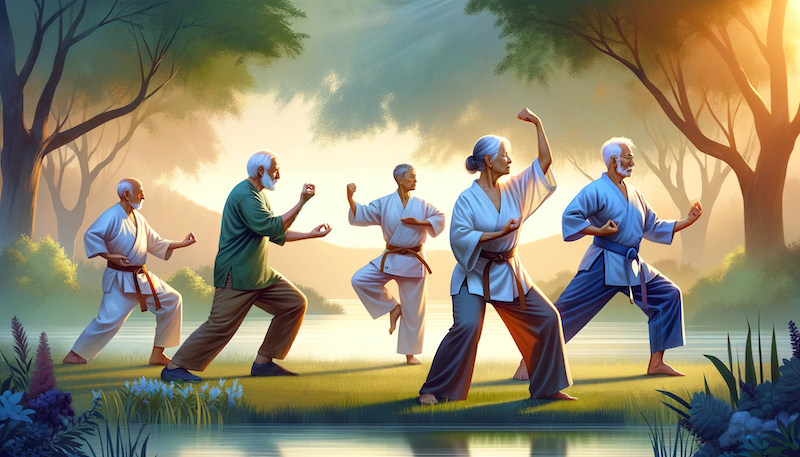
As we age, maintaining physical and mental health becomes increasingly important.
Martial arts, often perceived as high-energy and intense, can actually be a fantastic way for older adults to stay active, improve cognitive function, and enhance overall well-being.
This article focuses on the top 5 martial arts that are suitable for older adults, as backed by scientific research.
Contents
5 Best Martial Arts For Older Adults/Elderly
The 5 best martial arts for older adults and the elderly are tai chi, qi gong, karate, taekwondo, and Brazilian jiu-jitsu.
Each of these martial arts offers unique benefits, validated by scientific studies and expert opinions.
Whether your goal is to boost cognitive function, enhance functional fitness, improve mental health, or promote longevity, these martial arts cater to a wide range of needs and preferences.
Feel free to choose the one that resonates most with you, as all of them are well-suited for older adults seeking a healthier, more active lifestyle.
1. Tai Chi
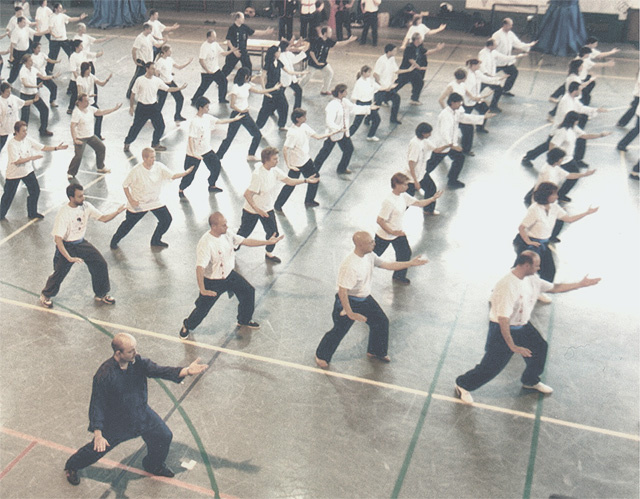
Tai Chi, an ancient Chinese martial art, combines gentle, flowing movements with deep, mindful breathing.
Often described as “meditation in motion”, it offers a low-impact exercise ideal for all ages, particularly beneficial for older adults.
This practice focuses on achieving harmony between mind and body, making it perfect for those seeking physical activity and mental relaxation.
Each movement in Tai Chi is deliberate and contributes to overall tranquility and stress reduction.
Key Benefits of Tai Chi
- Enhances Balance and Coordination: Reduces the risk of falls, a major concern for older adults.
- Improves Flexibility and Mobility: Aids in maintaining joint health and reducing stiffness.
- Strengthens Lower Body: Essential for daily activities and independence.
- Reduces Stress and Anxiety: Promotes mental calmness and clarity.
- Improves Cardiovascular Health: Gentle movements provide a low-impact cardiovascular workout.
- Enhances Overall Well-being and Mental Health: Encourages a sense of inner peace and relaxation.
Scientific Research Supporting Tai Chi’s Benefits
1. A comprehensive 2017 meta-analysis published in the Journal of the American Geriatrics Society (PMID: 28736853) highlights Tai Chi’s effectiveness in fall prevention.
Specifically, Tai Chi practice reduced the rate of falls and injury-related falls over the short term (less than 12 months) by approximately 43% and 50%, respectively.
2. Further reinforcing Tai Chi’s benefits, a 2022 study focused on the functional capacity of elderly individuals practicing Tai Chi.
The research revealed that long-term Tai Chi practitioners exhibited significantly better results in physical tests compared to their counterparts engaged in other forms of exercise.
Notably, improvements were observed in the 30-second chair stand test and flexibility measures like the chair sit-and-reach and back scratch tests.
These outcomes suggest enhanced lower body strength, flexibility, and overall physical condition, essential factors in maintaining independence and quality of life in older age.
3. A 2020 review of 13 studies involving 869 participants found that Tai Chi had a small positive effect on the quality of life and depressive symptoms of older adults with chronic conditions living in community settings.
This review, which focused on the impact of Tai Chi on mobility and physical endurance, found that the Tai Chi interventions, involving 40- to 90-minute sessions, significantly improved the quality of life and mental health of the participants.
Conclusion
The gentle nature of Tai Chi, combined with its profound impact on balance, strength, and flexibility, makes it a standout choice for seniors.
Tai Chi’s low-impact movements reduce the risk of injury, making it accessible to a broader range of older adults, including those with varying fitness levels or mobility limitations.
2. Qi Gong
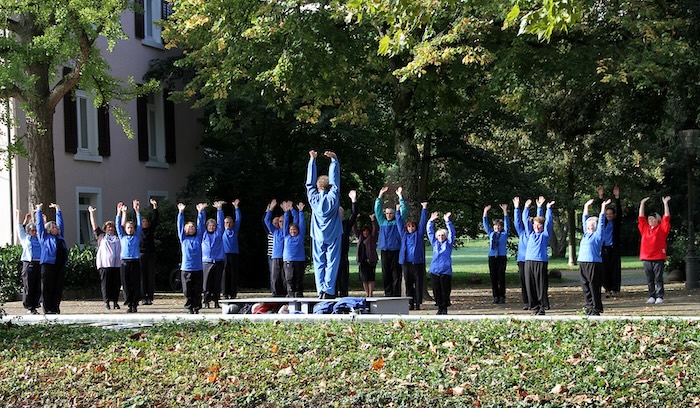
Qi Gong, a time-honored Chinese practice, blends gentle physical postures, flowing movements, and focused breathing techniques.
This holistic exercise, rooted in traditional Chinese medicine, is designed to cultivate and balance the body’s vital energy, known as ‘Qi’.
Its meditative aspect encourages mindfulness and mental clarity, making it especially suitable for older adults.
Qi Gong’s slow, deliberate movements are accessible to people of varying physical abilities and can significantly contribute to improved health, reduced stress levels, and enhanced overall well-being.
Key Benefits of Qi Gong
- Improves Balance and Stability: Essential for fall prevention in older adults.
- Enhances Flexibility and Mobility: Helps in maintaining joint health and reducing stiffness.
- Boosts Mental Health: Reduces stress and anxiety, promoting mental calmness.
- Strengthens Muscular System: Particularly beneficial for maintaining functional independence.
- Promotes Cardiovascular Health: Offers a form of low-impact cardiovascular exercise.
- Improves Respiratory Function: Through its focus on controlled breathing techniques.
Scientific Research Supporting Qi Gong’s Benefits
1. A global review of Qi Gong among older adults highlights its widespread practice and reported health benefits.
Practitioners often report better health outcomes than non-practitioners, especially concerning chronic physical and psychological conditions.
2. A 2020 study published in Frontiers in Medicine examined the effects of Medical Qi Gong on mobility and balance confidence in older adults.
The study found significant improvements in balance and gait (manner of walking), indicating that Qi Gong can be a valuable intervention for fall prevention and mobility enhancement in this age group.
3. Another study, published in the Journal of Nursing Research, reviewed clinical trials of Tai Chi and Qi Gong in older adults.
It concluded that these practices could improve physical function, reduce blood pressure, and alleviate depression and anxiety, further supporting their suitability for older adults.
Conclusion
Qi Gong’s combination of physical exercise and mental focus makes it an excellent choice for older adults.
Its adaptability and gentle nature ensure that it’s accessible to a wide range of older adults, including those with varying fitness levels or mobility limitations.
The scientific evidence underscores its effectiveness in improving both physical and mental health, making it a valuable component of a holistic approach to aging well.
3. Karate
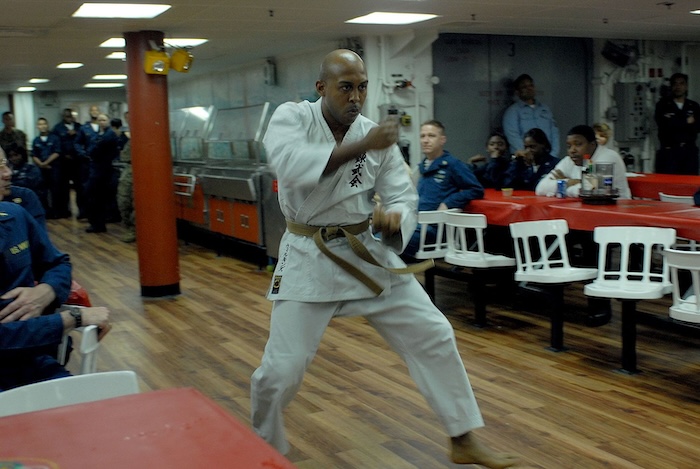
Karate, originating from Japan, is a martial art renowned for its disciplined approach to self-defense, focusing on precise striking techniques such as punches, kicks, and blocks.
It combines physical conditioning with mental and spiritual development, emphasizing respect, self-control, and perseverance.
For older adults, karate presents an opportunity to enhance physical strength, flexibility, and cognitive skills like focus and memory.
Its structured training regime and the ability to adapt to different fitness levels make it a suitable and rewarding practice for seniors seeking both physical activity and mental engagement.
Key Benefits of Karate
- Enhances Physical Strength and Flexibility: Improves overall body strength and maintains joint flexibility.
- Boosts Cognitive Function: Engages the mind through learning and practicing sequences and techniques.
- Improves Balance and Coordination: Essential for fall prevention and overall mobility.
- Promotes Cardiovascular Health: Provides a moderate-intensity cardiovascular workout.
- Reduces Stress: The focus and discipline required can have a calming effect.
Scientific Research Supporting Karate’s Benefits
1. A 2019 study published in the Journal of Physical Education investigated the effects of Karate-Dō training on older adults’ cognition.
The research found that participants in the karate group showed better results in visual memory tasks, executive functions, and memory complaints post-intervention, suggesting that karate practice is related to significant cognitive function improvements in healthy older adults.
2. Another 2022 study, “Five weeks of Yuishinkai karate training improves balance and neuromuscular function in older adults”, found that short-term karate training enhanced balance and strength in older adults, indicating its potential as a therapeutic exercise for this age group.
3. Research published on ResearchGate also highlighted the positive influence of karate training on static and dynamic balance, which is crucial for reducing the aging process’s impact.
The study concluded that karate training could be an interesting option to maintain healthy physical activity during aging.
Conclusion
Karate’s combination of physical and cognitive challenges makes it a suitable choice for older adults.
Its adaptability allows for modifications to suit individual fitness levels, ensuring safety and effectiveness.
The scientific evidence supports its role in improving physical strength, balance, cognitive function, and overall well-being, making karate a valuable addition to an older adult’s exercise regimen.
4. Taekwondo
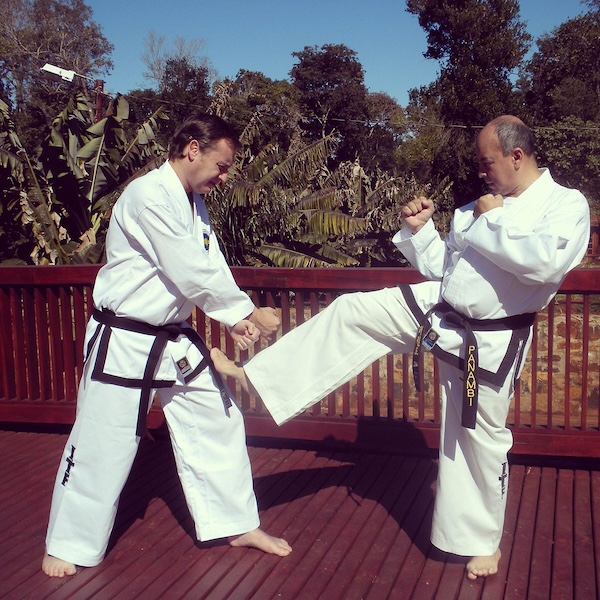
Taekwondo, a dynamic and energetic Korean martial art, is distinguished by its high-energy kicking and striking techniques. Taekwondo is a discipline that fosters mental strength, focus, and resilience.
For older adults, taekwondo provides a unique blend of aerobic exercise, which is vital for cardiovascular health, and cognitive stimulation, crucial for maintaining mental sharpness.
The practice encourages discipline, respect, and self-confidence, making it a comprehensive choice for seniors aiming to bolster their physical fitness, agility, and mental acuity in a structured and supportive environment.
Key Benefits of Taekwondo
- Improves Balance and Coordination: Essential for fall prevention and overall mobility.
- Enhances Flexibility and Strength: Helps in maintaining muscle tone and joint health.
- Boosts Cognitive Function: Engages the mind through learning sequences and techniques.
- Promotes Cardiovascular Health: Provides a cardiovascular workout through dynamic movements.
- Reduces Stress: The discipline and focus required can have a calming effect.
Scientific Research Supporting Taekwondo’s Benefits
1. A study published in Medicine & Science in Sports & Exercise found that taekwondo training can be beneficial for improving balance and neuromuscular function in older adults, suggesting its potential as a therapeutic exercise for this age group.
2. The 2022 scoping review “Functional Benefits of Hard Martial Arts for Older Adults” highlighted the positive impact of hard martial arts like taekwondo on functional fitness parameters such as strength, mobility, aerobic endurance, and balance in older adults.
Other hard martial arts included in this study shown to have benefits were karate, Brazilian jiu-jitsu, and judo.
3. A 2023 study in BMC Geriatrics explored the health benefits of a modified taekwondo activity among nursing home residents.
It found that taekwondo can promote mental health, increase physical functions, stimulate cognitive abilities, and facilitate positive social interaction.
Conclusion
Taekwondo’s combination of physical and cognitive challenges makes it a suitable choice for older adults.
Its adaptability allows for modifications to suit individual fitness levels, ensuring safety and effectiveness.
The scientific evidence supports its role in improving balance, strength, cognitive function, and overall well-being, making taekwondo one of the best martial arts for older adults and the elderly.
5. Brazilian Jiu-Jitsu
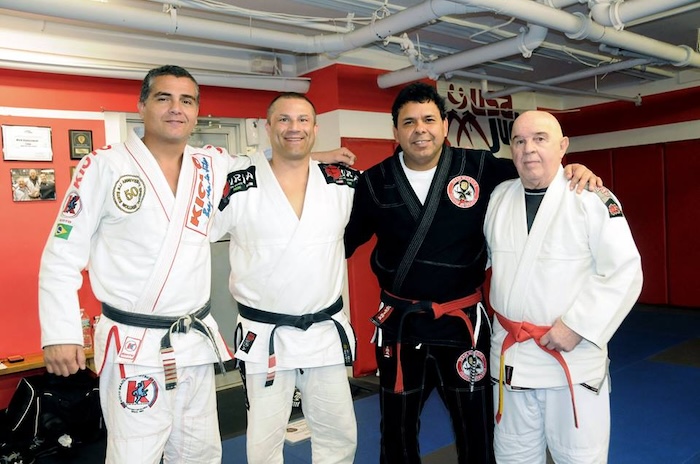
Brazilian jiu-jitsu (Bjj), a martial art with its roots in Japan and refined in Brazil, specializes in ground fighting and grappling techniques.
It stands out for its strategic approach, where leverage and skill are prioritized over physical power, making it particularly suitable for older adults.
Bjj offers a safe training environment, as it focuses on submissions and control without the strikes found in other martial arts, addressing concerns about impact-related injuries.
Bjj enhances physical strength and flexibility and sharpens the mind through its complex techniques and problem-solving aspects.
For seniors, BJJ is an excellent way to stay active, engage in social interaction, and develop self-defense skills in a low-impact, respectful setting.
Key Benefits of Brazilian Jiu-Jitsu
- Improves Functional Fitness: Enhances strength, flexibility, and endurance, crucial for daily activities.
- Promotes Cognitive Health: Engages strategic thinking and problem-solving skills.
- Enhances Balance and Coordination: Vital for fall prevention and overall mobility.
- Low-Impact Nature: Suitable for older adults, reducing the risk of high-impact injuries.
- Social Interaction: Offers opportunities for community building and social engagement.
Scientific Research Supporting Brazilian Jiu-Jitsu’s Benefits
1. A study on ResearchGate reported that 12 weeks of Brazilian jiu-jitsu training improved functional fitness in elderly men.
The research highlighted significant gains in strength, flexibility, aerobic endurance, and motor agility/dynamic balance, demonstrating Bjj’s effectiveness in promoting physical health in older adults.
2. The 2022 scoping review “Functional Benefits of Hard Martial Arts for Older Adults” also included Brazilian Jiu-Jitsu.
It emphasized the positive impact of martial arts like Bjj on functional fitness parameters such as strength, mobility, and balance in older adults.
3. Another study published in the Journal of Gerontology and Geriatrics reviewed the effect of combat sports, including Brazilian jiu-jitsu, on physical fitness and activities of daily living in older adults.
The systematic review and meta-analysis found evidence of increases in muscle strength, flexibility, agility, and balance among participants practicing these sports.
Conclusion
Brazilian Jiu-Jitsu’s blend of physical and cognitive engagement, along with its low-impact nature, makes it an excellent martial art for older adults.
The scientific evidence supports its role in improving functional fitness, cognitive health, and social well-being, making Bjj a great martial art for an older adult’s exercise regimen.

